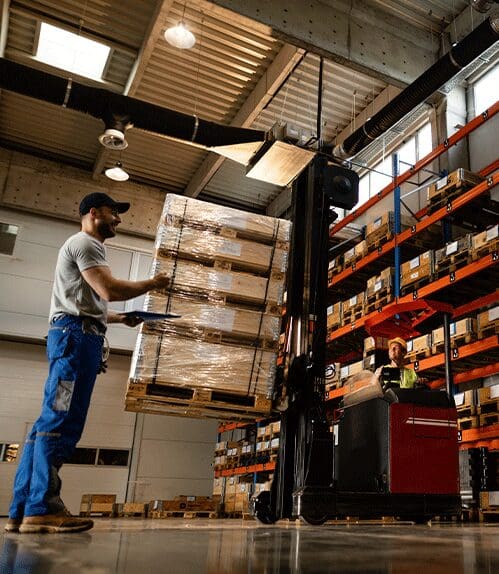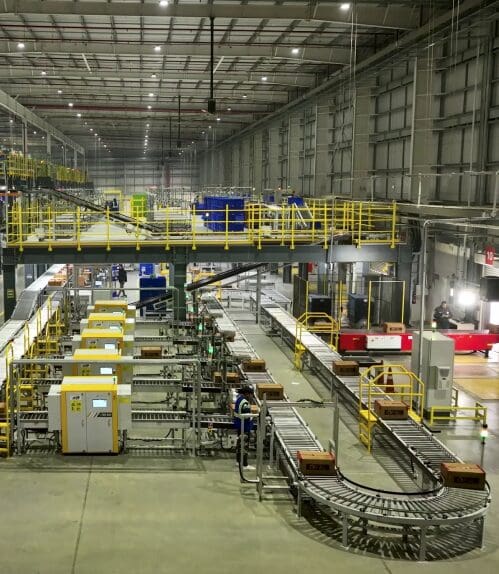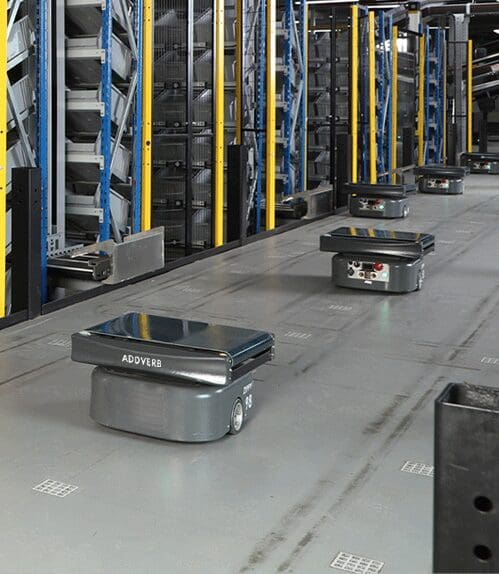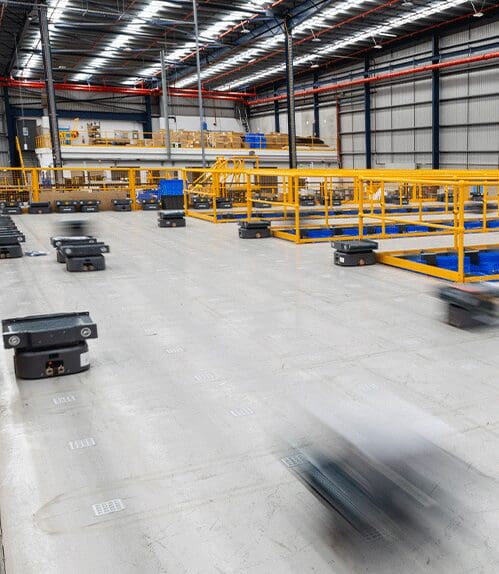Table of Contents
In today’s fast-paced logistics environment, optimising supply chain operations is crucial for staying competitive. Warehouse Management Systems (WMS) play a pivotal role in this optimisation by streamlining inventory management, improving order accuracy, and accelerating fulfillment processes.
By integrating advanced WMS system, businesses can enhance operational efficiency, reduce costs, and deliver superior customer experiences, ultimately transforming their supply chain for the better.
Warehouse Management System
A Warehouse Management System (Optimus) is a database-driven software that optimises critical operations such as shipping, receiving, picking, and put-away. With the ability to track inventory levels in real-time, WMS boosts warehouse productivity by improving accuracy, reducing cutaways, and facilitating efficient stock management.
But beyond warehouse operations, WMS is a backbone in streamlining the entire supply chain. By improving information flow, reducing inefficiencies, and enabling smarter decision-making, Warehouse Management System directly impacts supply chain performance, fostering agility and customer satisfaction.
The global warehouse management system market size was valued at USD 3.94 billion in 2023 and is projected to grow at a compound annual growth rate (CAGR) of 19.5% from 2024 to 2030.
Source: Grand View Research
How Warehouse Management System Enhances SCM
A supply chain involves the flow of goods and services, right from the raw materials to production work-in-progress, and until the delivery to the customer. In this chain, the warehouse is an integral part that ensures operations to happen effectively from suppliers to the immediate customers. A free-flowing logistics supply chain is nearly impossible without a powerful warehouse management system, as it removes all the irregularities, delayed sourcing, inventory management, and many other factors hindering the chain.
A Centralised Platform for End-to-End Visibility
WMS offers a unified platform that connects various functions across the supply chain, such as storage, shipping, and distribution. By integrating these processes under one software solution, WMS eliminates information gaps and friction among suppliers, logistics providers, and customers.
This centralised visibility ensures that data flows seamlessly across the supply chain, enabling quicker decision-making and real-time collaboration between stakeholders. The result is improved coordination, reduced delays, and a stronger foundation for scaling operations.
Inbound and Outbound Process Optimization
Warehouse Management System is equipped with tools that allow for the automation of key warehouse processes, optimising both inbound (receiving, storing) and outbound (order fulfilment, shipping) activities. Advanced features like real-time tracking and predictive analytics help plan resource allocation, manage labour effectively, and optimise space utilisation within the warehouse.
For instance, WMS can dynamically determine the most efficient storage locations for products, minimising travel time and increasing picking speed. Additionally, it facilitates route optimisation for deliveries, ensuring that products are shipped with minimal lead times, ultimately enhancing customer service.
Reduction of Operational Costs
One of the standout benefits of a Warehouse Management System is its ability to reduce operational costs. By automating tasks like cycle counts and inventory updates, WMS reduces the need for manual intervention, lowering labour costs and the risk of human error. Businesses can plan more frequent inventory audits, ensuring more accurate stock levels without disrupting ongoing operations.
Moreover, WMS enhances overall warehouse efficiency by optimising space, cutting down on excess inventory, and preventing overstock or stockouts. This allows for better cash flow management and reduces the capital tied up in unsold inventory.
Enhanced Inventory Accuracy and Visibility
In the modern warehouse, maintaining accurate inventory levels is critical to supply chain success. Warehouse Management System leverages technologies like barcode scanning, RFID tagging, and serial number tracking to capture detailed data about goods stored within the warehouse. This real-time data is transmitted to the central system, offering up-to-the-minute reports on stock levels and locations.
Accurate inventory data enables businesses to respond to demand fluctuations proactively. With improved forecasting capabilities, warehouses can anticipate stock shortages or overages and adjust procurement or production schedules accordingly. This leads to better alignment between supply and demand, particularly during seasonal peaks or promotional events.
Explore Addverb’s Advanced Software Solutions
Advanced Reporting and Analytics
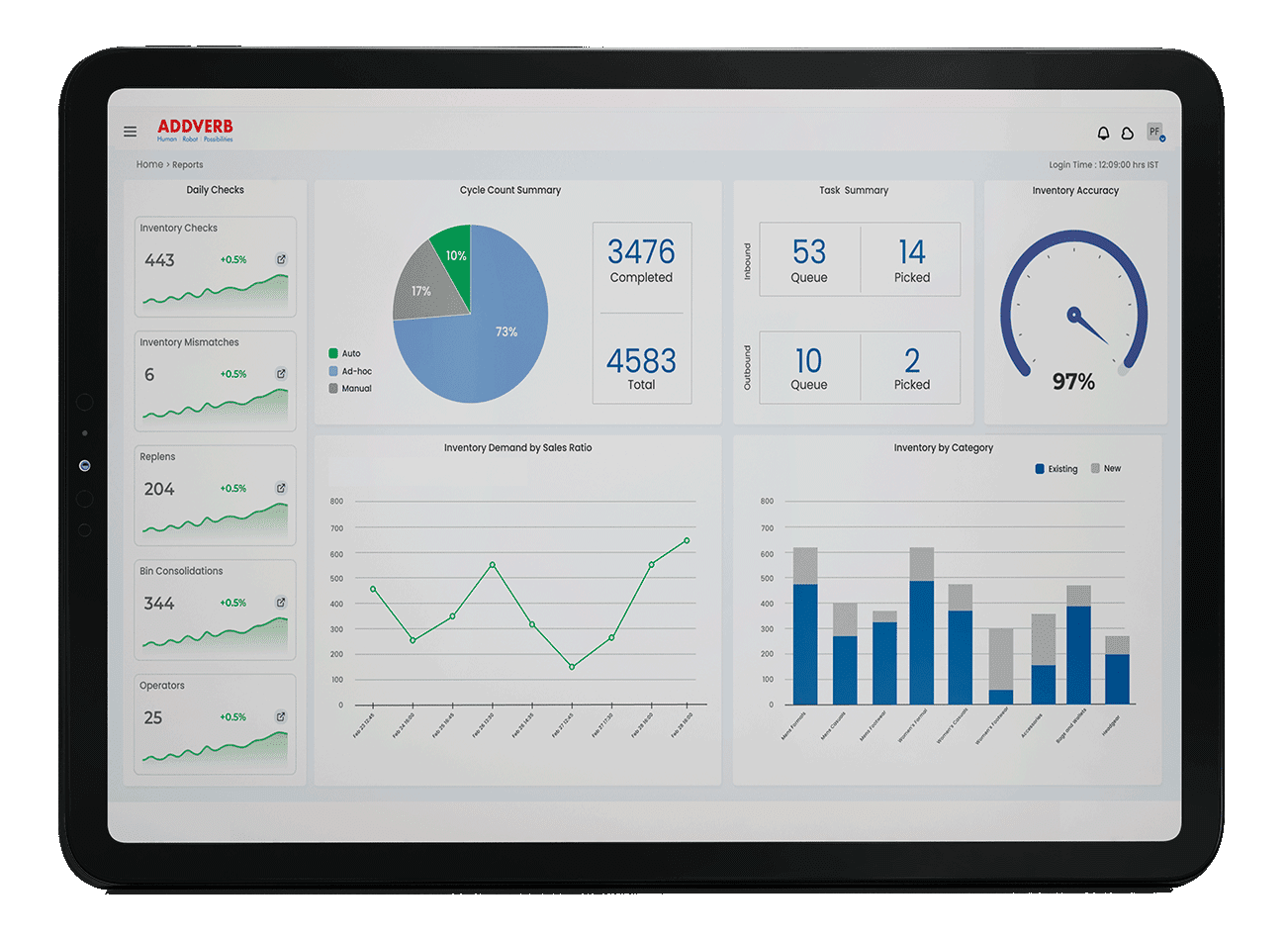
One of the most significant contributions of a WMS is its robust reporting and analytics capabilities. WMS can generate comprehensive reports on key performance indicators (KPIs) such as order accuracy, lead time, fulfilment rates, and labour productivity. This level of insight helps management make informed decisions to improve overall warehouse operations.
Additionally, the system allows for exception reporting, where issues like delayed shipments, stockouts, or bottlenecks are flagged in real-time. Businesses can address problems quickly, either by rerouting orders or finding alternative suppliers, which helps maintain smooth supply chain operations and ensures customer satisfaction.
Seamless Integration with Other Systems
WMS is not a standalone system. Its ability to integrate with other software solutions like Enterprise Resource Planning (ERP) systems, Fleet Management Systems (FMS), and Warehouse Control Systems (WCS) adds significant value. This integration ensures that data is shared effortlessly between systems, offering a more comprehensive view of supply chain operations.
For instance, integrating WMS with ERP can ensure that production schedules align with real-time inventory levels, preventing overproduction or delays due to material shortages. Similarly, integration with FMS can optimize transportation routes, further reducing costs and improving delivery times.
READ MORE: Digital Twin in Warehouses: Benefits, Applications, and User Impact
Improved Customer Satisfaction and Scalability
A WMS enhances the reliability and speed of order fulfilment, leading to better customer experiences. Faster shipping, more accurate orders, and fewer stockouts contribute to increased customer satisfaction, which is vital in today’s competitive market. Moreover, WMS is scalable as businesses grow and can adapt to increasing volumes and complexities without disrupting operations.
As e-commerce grows, businesses must meet customer expectations for rapid, accurate delivery. A well-implemented WMS ensures that warehouses can keep up with these demands, providing flexibility and scalability for future growth.
Conclusion
Warehouse Management Systems (Optimus) are not just about managing inventory within a warehouse; they are integral to the entire supply chain. By providing a centralised platform for visibility, optimising processes, and reducing costs, WMS can streamline operations and enhance the customer experience. As businesses scale, WMS offers the flexibility and adaptability necessary to meet growing demand and stay competitive in today’s fast-paced market.
However, adopting a WMS requires careful planning. It’s a long-term investment that requires proper integration with existing systems and alignment with the company’s strategic goals. Businesses must ensure that staff are adequately trained, and that the system is fully utilised to realize its full potential.
FAQ
What is a Warehouse Management System (WMS)?
A WMS is software that manages and optimizes warehouse operations like inventory tracking, order fulfilment, and stock management.
How does WMS improve supply chain efficiency?
It automates tasks, reduces manual errors, enhances inventory accuracy, and improves order processing speed, leading to streamlined supply chain operations.
Can WMS reduce operational costs?
Yes, by optimizing inventory levels, minimizing errors, and improving labour productivity, WMS helps reduce overall operational costs.
What types of businesses benefit from WMS?
Any business with warehousing needs—such as retail, e-commerce, manufacturing, and logistics—can benefit from implementing a WMS.
Is WMS scalable for growing businesses?
Yes, WMS solutions are highly scalable, supporting the growing needs of businesses as their operations expand.
Founded in 2016, Addverb offers complete robotics solutions for warehouse and industrial automation, with a strong global presence through its subsidiaries worldwide. The company provides a range of in-house automation products, including Autonomous Mobile Robots, ASRS, and sorting technologies. It serves over 350+ clients, including well-known companies such as Coca-Cola, Amazon, and DHL.


